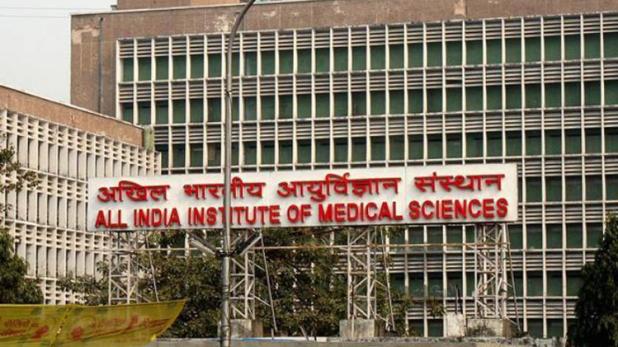No roof for patients at AIIMS, scores brave cold in the open
New Delhi, Jan 31 : Four-year-old Aashirvaad Kumar has had the hole in his heart fixed by the doctors at the All India Institute of Medical Sciences (AIIMS), the country’s premier government-run research and referral hospital, but he is still trying to the fix the hole over his head to find a shelter in the national capital’s chilling winter.
The reason? He is back in Delhi four months after his heart surgery for consultation and is unable to find a shelter to brave the bitter chill.

This is because the night shelters near the hospital are completely packed. But his grandfather finally found a space for him and his mother near the gate of the AIIMS Metro Station gate — where scores of other patients and their attendants are huddled.
Grandfather Mahendra Singh, covering his face with a blanket and pointing towards Aashirvaad, told IANS: “We came here some days ago for some medical check-ups. But we cannot find a shelter to protect ourselves against the winter nights. So we spend the night here.”
Dimshri Mukhiya, a resident of Darbhanga in Bihar, is suffering from some nervous disorder and is unable to walk or even stand. Now the street outside the hospital has become her permanent abode.
“I have been getting treatment at AIIMS for over the last two years,” she said. “And due to me, my husband Pradeep, who was a good farmer, has become a labourer.”
“When we were in our village, we never slept on the streets, but for the last two years we had to brave all this,” she said.
Mukhiya and her husband too are sleeping under the open sky with plastic sheets over their blankets for added protection.
Asked why she was using plastic sheets, she replied: “Due to the dew and the rain, the blanket gets wet but the plastic sheet saves it from that.”
Several patients, along with their attendants, were found sleeping at the bus stop near the hospital’s gate.
The Delhi government has opened four night shelters near AIIMS, one even in the subway connecting AIIMS and Safdarjung Hospital across the road. Mobile toilets have been stationed outside the night shelters, but this IANS correspondent could not find a single attendant manning them.
Enqiries revealed that all the night shelters are packed by 9 p.m.
Lokendra, a resident of Baghpat in Uttar Pradesh, said: “By the time we got free from the hospital, all the night shelters were full.”
Lokendra, a daily labourer, said that he had arrived in the city for his wife’s treatment. “My wife has some intestine problem and I had to come here for better treatment,” he said.
The AAP government’s Delhi Urban Shelter Improvement Board (DUSIB), while announcing its Winter Action Plan on December 15, 2017, said it is running 251 shelters — 83 of them housed in permanent buildings and 113 operating out of porta-cabins. Fifty-five temporary shelters in tents have also been put up for the winter season.
Although the Board claims that the night shelters can accommodate close to 20,000 people, only about 10,000 homeless people are using them. The Delhi government has also announced that it will serve breakfast of “tea and rusk” till the end of January to those occupying the night shelters.
The DUSIB said that to bring the homeless to the night shelters, 20 rescue teams have also been pressed into service and will be doing the rounds every night. They can be contacted by citizens who want to report on the homeless by dialling a 24X7 control room number (011-23378789/8527898295/96) and a “Rain Basera” mobile application.
To check the effectiveness of the DUSIB helpline, the IANS correspondent, who was accompanied by Sunil Kumar Aledia, Executive Director of the NGO Centre for Holistic Development, clicked the picture of a man sleeping in the open at AIIMS’ gate No. 1 and shared it on the Rain Basera app. But even after 30 minutes, no rescue team arrived to take that man to any of the nearby shelters.
To the contrary, the status of the complaint was shown as closed after 30 minutes.
Thousands of people in the national capital are still forced to live on the streets of the city. According to a 2014 DUSIB survey, the number of homeless in Delhi is 16,000, while various NGOs estimate that the number may run up to 100,000 or more.
“At least 40,000 homeless people have died between January 1, 2004, and December 31, 2017,” Aledia said.
He also said that in the first two weeks of January, over 50 people have died. In December last year alone, over 200 people have died in Delhi.
The Bharatiya Janata Party (BJP) and the Congress have earlier attacked the Arvind Kejriwal government over the deaths of the homeless people in the city. Delhi BJP unit chief Manoj Tiwari has accused Chief Minister Kejriwal of being insensitive, while city Congress chief Ajay Maken has accused the government of not taking any steps to provide them help or relief.
IANS







